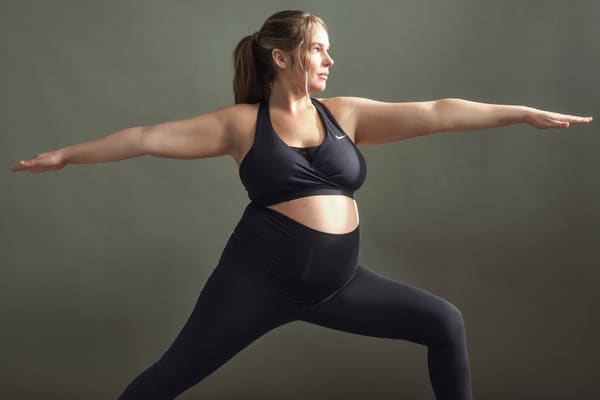A Gentle Guide to Moving Your Body After Pregnancy Loss
This is Nike (M)
Once you're ready, exercise can be a mood booster and a productive outlet for stress and grief.
- The recovery process after pregnancy loss depends heavily on your circumstances, but across the board, the first thing you should do is give yourself time.
- Studies show that exercise can help you heal—physically and emotionally—by helping to reduce stress hormones, among other benefits.
- Focusing on the mental health benefits of movement can help you feel more motivated if your drive to exercise is temporarily MIA.
Read on to learn more …

*This content is designed to inform and inspire, but it is not meant to diagnose, treat or give specific medical advice. Always check with your health care provider about how to stay healthy and safe before, during and after pregnancy.
There is no one-size-fits all approach to navigating a pregnancy loss. So much depends on your circumstances, how far along you were and how the loss happened. But one thing holds true no matter what: exercise can support your emotional and physical recovery process, says Amanda Williams, MD, a board-certified obstetrician-gynaecologist in Oakland, California, and a member of the Nike (M)ove Like a Mother advisory board. If you're wondering how—and when—to start moving safely post loss, this comforting guide can help.
Take time to process.
Whenever a pregnancy ends—whether it's after giving birth to a healthy baby or after a loss—your body experiences a sharp decline in oestrogen and progesterone, which can trigger depression or anxiety, says Crystal Clark, MD, an associate professor of psychiatry and obstetrics and gynaecology at the Northwestern University Feinberg School of Medicine in Chicago. In the case of pregnancy loss, you may also be dealing with grief or even trauma, she says. So if you don't feel motivated to exercise, that's natural. Allow yourself a few weeks to rest and process what you've been through. For many people, says Dr Williams, "the body heals a lot faster than the mind and the heart do".
Check in with your health care practitioner.
Dr Williams notes that it's typically OK to do some low-impact activity, like walking, in the days after a pregnancy loss. But for higher-impact workouts, talk with your doctor to make sure you're in the clear. Your clinician will likely consider how far along you were in the pregnancy, how the loss happened and whether you are still bleeding heavily, says Dr Williams. For instance, was the loss during the first trimester or later in the second or third? Did it require medication or a procedure? Did you have a C-section? All these variables will impact your recovery and how soon you can get moving again.
In general, says Dr Williams, people who miscarry in the first trimester can often return to their exercise routine within a week or two if the bleeding has stopped or become light spotting. But if you're still bleeding heavily, she says, hold off on vigorous exercise, since it could increase your risk of excessive bleeding or haemorrhaging.
For a third-trimester loss, Dr Williams says you may need to wait about three to four weeks before resuming high-energy workouts. And if you've had a C-section, she advises waiting a minimum of eight to 12 weeks before doing traditional abdominal exercises like planks, although breath-based deep core and pelvic floor recovery work is helpful (more on that below).

Ease in.
When you do begin to exercise again, start off easy with low-impact activities like walking (keep it to five or 10 minutes at first) or gentle yoga, says Meghan Rosenfeld, a Nike Trainer and the owner of Trimester Fit Body in Doylestown, Pennsylvania, who has experienced pregnancy loss herself. One benefit of walking, she says, is that it gets you outside and being in nature can help lower stress hormones such as cortisol (research from the University of Michigan confirms this). "It's very cathartic", says Rosenfeld. "It gives you time to be by yourself and with your thoughts".
When you're ready to take it up a notch, add time to your walks and slowly progress to higher-intensity workouts like jogging, swimming or lifting light weights. If that feels good and you're eager for more, you can transition into sweatier pursuits.
If you start to experience any new bleeding, fever, chills or pain, stop and let your doctor know. Though these symptoms are rare, they could be a sign of infection, according to the American College of Obstetricians and Gynaecologists.
Just breathe.
Even if you have no interest in working out (again, completely understandable), Rosenfeld suggests you try diaphragmatic breathing. This relaxing technique can help activate your core and strengthen the connection between the transverse abdominis, which wraps around your midsection and makes up the deepest layer of ab muscles, and the pelvic floor, which may be strained after supporting the extra weight of a pregnancy.
You can practise diaphragmatic breathing at any point after a pregnancy loss and you don't even have to get out of bed to do it effectively. To start, inhale through your nose as you let your ribcage expand laterally and feel your pelvic floor relax. Then exhale slowly through your mouth as you squeeze and lift your pelvic floor and feel your belly draw in. If you have trouble feeling your pelvic floor, imagine you're trying to pick up and hold a blueberry with the muscles between your pubic bone and tailbone, says Rosenfeld.
Once you get the hang of diaphragmatic breathing, you'll be helping to stabilise your core without even breaking a sweat.
Focus on the emotional benefits.
There's no pressure to move your body when you're grieving (or ever). But if it's been several weeks and you're still having a hard time returning to your workouts despite wanting to, bear in mind that "exercise is one way to start to get back into emotional wellness", says Dr Clark. Seeking mental health support is a good idea too; it can help you with motivation as well as emotional healing.
Rosenfeld says that her workouts helped her process pregnancy loss in a visceral way. "Once I was up for running, I found that as the sweat was dripping out of me, so were the tears", she says. "It felt really good. It was another way my body was releasing these emotions that I was holding onto so tightly".
Let it out and trust that brighter days are ahead.
Words: Rachel Rabkin Peachman
Photography: Vivian Kim
CHECK IT OUT
Ready to move your body but not sure where to start? Find a programme that's right for you in the Nike Training Club App, then find more expert-backed mindset advice on Nike.com.




